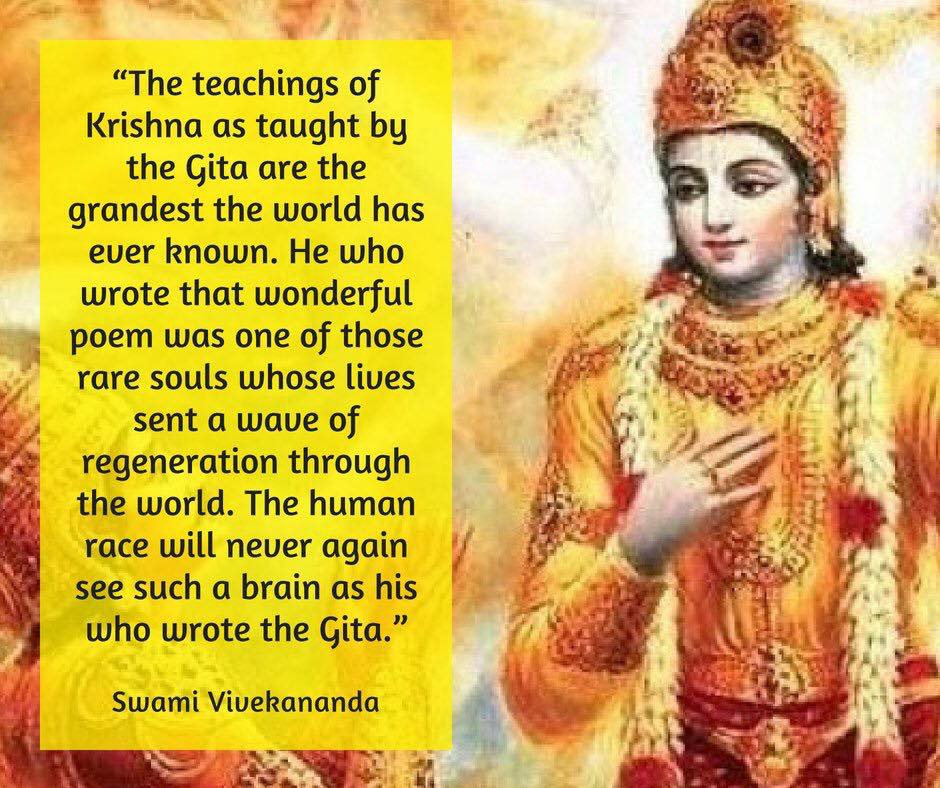
In this website we have been preparing a series of articles on Swami Vivekananda‘s quotes and comments on Bhagavad Gita.
In this article our topic is Swami Vivekananda‘s quotes and comments on greatness of Bhagavad Gita.
Swami Vivekananda told—
- First see the irony of it. Jesus Christ, the God of the Europeans, has taught: Have no enemy, bless them that curse you; whosoever shall smite thee on thy right cheek, turn to him the other also; stop all your work and be ready for the next world; the end of the world is near at hand. And our Lord in the Gita is saying: Always work with great enthusiasm, destroy your enemies and enjoy the world. But, after all, it turned out to be exactly the reverse of what Christ or Krishna implied. The Europeans never took the words of Jesus Christ seriously. Always of active habits, being possessed of a tremendous Râjasika nature, they are gathering with great enterprise and youthful ardour the comforts and luxuries of the different countries of the world and enjoying them to their hearts’ content. And we are sitting in a corner, with our bag and baggage, pondering on death day and night, and singing,” नलिनीदलगतजलमतितरलं तद्वज्जीवितमतिशयचपलम्—Very tremulous and unsteady is the water on the lotus-leaf; so is the life of man frail and transient”—with the result that it is making our blood run cold and our flesh creep with the fear of Yama, the god of death; and Yama, too, alas, has taken us at our word, as it were—plague and all sorts of maladies have entered into our country! Who are following the teachings of the Gita?—the Europeans. And who are acting according to the will of Jesus Christ?—The descendants of Shri Krishna! This must be well understood.[Source]
- Take the Sermon on the Mount and the Gita — they are simplicity itself. Even the streetwalker can understand them. How grand! In them you find the truth clearly and simply revealed.[Source]
- The greatest incident of the war was the marvellous and immortal poem of the Gitâ, the Song Celestial. It is the popular scripture of India and the loftiest of all teachings. It consists of a dialogue held by Arjuna with Krishna, just before the commencement of the fight on the battle-field of Kurukshetra. I would advise those of you who have not read that book to read it. If you only knew how much it has influenced your own country even! If you want to know the source of Emerson’s inspiration, it is this book, the Gita. He went to see Carlyle, and Carlyle made him a present of the Gita; and that little book is responsible for the Concord Movement. All the broad movements in America, in one way or other, are indebted to the Concord party.[Source]
- The Bhagavad-Gita . . . is the best commentary we have on the Vedanta philosophy — curiously enough the scene is laid on the battlefield, where Krishna teaches this philosophy to Arjuna; and the doctrine which stands out luminously in every page of the Gita is intense activity, but in the midst of it, eternal calmness.[Source]
- The Gita is a commentary on the Upanishads. The Upanishads are the Bible of India. They occupy the same place as the New Testament does.[Source]
- The Gita is like a bouquet composed of the beautiful flowers of spiritual truths collected from the Upanishads.[Source]
- The Gita is the gist of the Vedas. It is not our Bible; the Upanishads are our Bible. It [the Gita] is the gist of the Upanishads and harmonizes the many contradictory parts of the Upanishads.[Source]
- The Gita is to the Hindus what the New Testament is to the Christians.[Source]
- The greatness of little things, that is what the Gita teaches — bless the old book!! . . .[Source]
- The reconciliation of the different paths of Dharma, and work without desire or attachment — these are the two special characteristics of the Gita.[Source]
- The restless Western atheist or agnostic finds in the Gita or in the Dhammapada the only place where his soul can anchor.[Source]
- The teachings of Krishna as taught by the Gita are the grandest the world has ever known. He who wrote that wonderful poem was one of those rare souls whose lives sent a wave of regeneration through the world. The human race will never again see such a brain as his who wrote the Gita.[Source]
Main article
You may read the main article too—